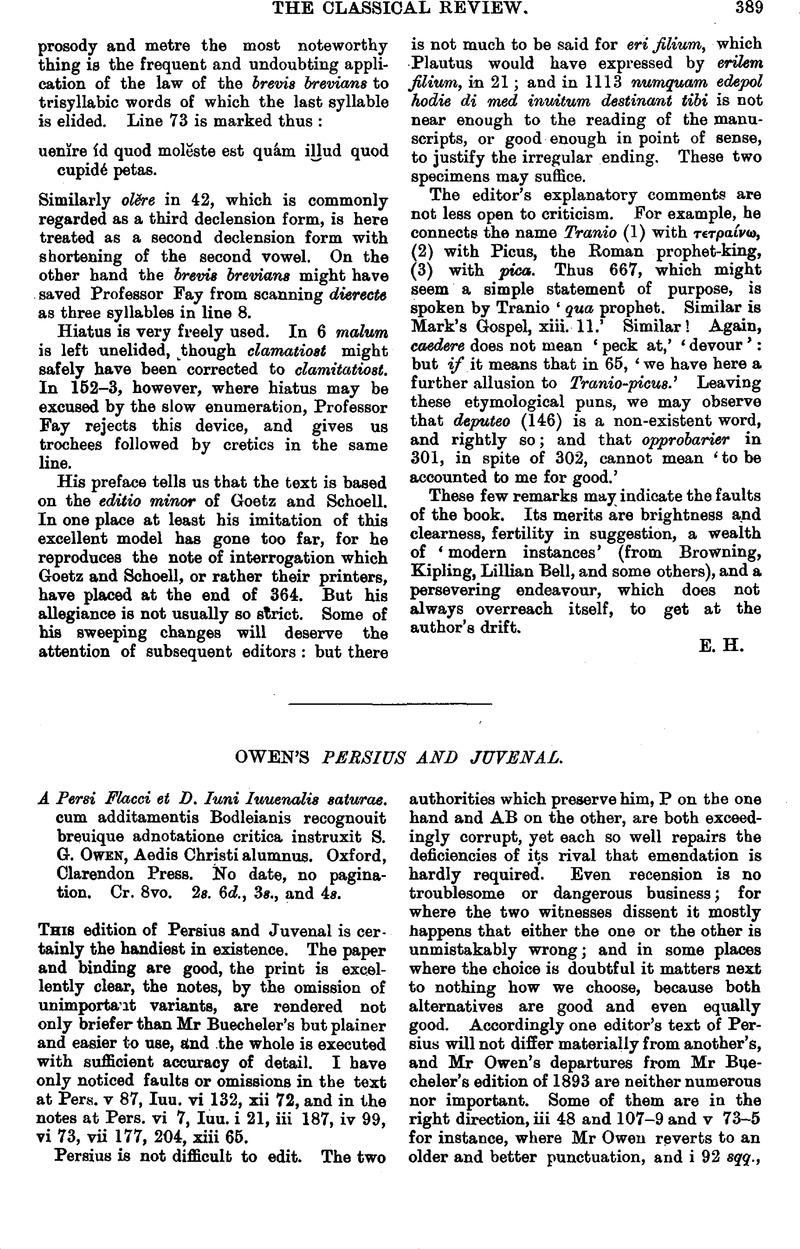No CrossRef data available.
Published online by Cambridge University Press: 27 October 2009

page 391 note 1 I do not know if he has himself consulted also Monac. 408, but I observe that at ix 150 he cites it as having ecfugit, which I conjectured in 1891 (C. R. v. p. 295), while Mr Hosius gives its reading as efugit.
page 391 note 2 In speaking of excess and defect I may add that Mr Owen ignores Hirschfeld's transposition of i 127—31, which ought to be mentioned, and mentions the conjectures lacernatus at i 62 and tergo at iii 281, which ought to be ignored. Markland's capital emendation of v 137, ‘uos estis frater’, proposed at Stat. silu. p. 73, seems to have escaped all editors of Juvenal.
page 393 note 1 At u. 6 of this fragment the note runs ‘colocyntha (i. q. σικα)…barbata chelidon (i. q. Socraticus cinaedus ii 10) scripsi Housmanno obtemperans’. If Mr Owen chooses to tax Roman householders with the incomprehensible vagary of maintaining Socratici cinaedi in their establishments, that is his own concern; but I wish he would not represent it as a concession to me, who explain barbata chelidon very differently indeed (C. R. xiii p. 266).
I cannot always be writing papers on this precious relic of antiquity, so I use this opportunity to make two remarks on Mr H. L. Wilson's article in the American Journal of Philology xxii pp. 268—82, which he has been good enough to send me. In u. 1, where some think quacumque indefinite (=qualibet), I think it relative ; because otherwise the construction is disjointed and the sense is untrue. Mr Wilson objects ‘but quicumque is never relative in Juvenal after prepositions except viii 60’. I do not dwell on the fact that Mr Wilson has overlooked viii 134 ‘de quocumque uoles proauum tibi sumito libro’, because I much doubt whether this verse is Juvenal's : I only comment on the singular argument that an author who uses a construction once is not likely to use it twice.
At u. 24 ‘in teneris haerebit dextera lumbis’ Mr Wilson says that not withstanding my positive assertion ‘teneris h. d. lumbis (ipsius of course)’ he still believes teneris to mean tenerorum: this inclination, he says, ‘regularly indicated indifference to women’. I do not ask Mr Wilson to quote a single passage which supports this statement; I only invite him to emend away the hundreds of passages which contradict it, beginning, say, with Hor. serm, ii 3 325. He adds ‘otherwise we lose the point of the passage, viz. the attempt on the part of the obscenus to conceal from the husband his real character.’ The truth is just the contrary: between φιλοπαιδα and φιλογυνα the Romans saw no incongruity at all, but they did see incongruity between τ πσχειν and τ δρν.